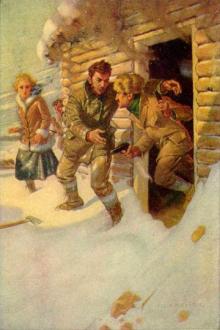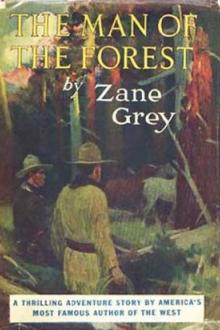Astoria; Or, Anecdotes of an Enterprise Beyond the Rocky Mountains by Irving (top romance novels .TXT) 📗

- Author: Irving
Book online «Astoria; Or, Anecdotes of an Enterprise Beyond the Rocky Mountains by Irving (top romance novels .TXT) 📗». Author Irving
For several days they kept patiently on, watching every sign that might give them an idea as to where they were, and how near to the banks of the Missouri.
Though there were numerous traces of hunting parties and encampments, they were not of recent date. The country seemed deserted. The only human beings they met with were three Pawnee squaws, in a hut in the midst of a deserted camp. Their people had all gone to the south, in pursuit of the buffalo, and had left these poor women behind, being too sick and infirm to travel.
It is a common practice with the Pawnees, and probably with other roving tribes, when departing on a distant expedition, which will not admit of incumbrance or delay, to leave their aged and infirm with a supply of provisions sufficient for a temporary subsistence. When this is exhausted, they must perish; though sometimes their sufferings are abridged by hostile prowlers who may visit the deserted camp.
The poor squaws in question expected some such fate at the hands of the white strangers, and though the latter accosted them in the kindest manner, and made them presents of dried buffalo meat, it was impossible to soothe their alarm, or get any information from them.
The first landmark by which the travellers were enabled to conjecture their position with any degree of confidence, was an island about seventy miles in length, which they presumed to be Grand Isle. If so, they were within one hundred and forty miles of the Missouri. They kept on, therefore, With renewed spirit, and at the end of three days met with an Otto Indian, by whom they were confirmed in their conjecture. They learnt at the same time another piece of information, of an uncomfortable nature. According to his account, there was war between the United States and England, and in fact it had existed for a whole year, during which time they had been beyond the reach of all knowledge of the affairs of the civilized world.
The Otto conducted the travellers to his village, situated a short distance from the banks of the Platte. Here they were delighted to meet with two white men, Messrs. Dornin and Roi, Indian traders recently from St. Louis. Of these they had a thousand inquiries to make concerning all affairs, foreign and domestic, during their year of sepulture in the wilderness; and especially about the events of the existing war.
They now prepared to abandon their weary travel by land, and to embark upon the water. A bargain was made with Mr. Dornin, who engaged to furnish them with a canoe and provisions for the voyage, in exchange for their venerable and well-tried fellow traveller, the old Snake horse.
Accordingly, in a couple of days, the Indians employed by that gentleman constructed for them a canoe twenty feet long, four feet wide, and eighteen inches deep. The frame was of poles and willow twigs, on which were stretched five elk and buffalo hides, sewed together with sinews, and the seams payed with unctuous mud. In this they embarked at an early hour on the 16th of April, and drifted down ten miles with the stream, when the wind being high they encamped, and set to work to make oars, which they had not been able to procure at the Indian village.
Once more afloat, they went merrily down the stream, and after making thirty-five miles, emerged into the broad turbid current of the Missouri. Here they were borne along briskly by the rapid stream; though, by the time their fragile bark had floated a couple of hundred miles, its frame began to show the effects of the voyage. Luckily they came to the deserted wintering place of some hunting party, where they found two old wooden canoes. Taking possession of the largest, they again committed themselves to the current, and after dropping down fifty-five miles further, arrived safely at Fort Osage.
Here they found Lieutenant Brownson still in command; the officer who had given the expedition a hospitable reception on its way up the river, eighteen months previously. He received this remnant of the party with a cordial welcome, and endeavored in every way to promote their comfort and enjoyment during their sojourn at the fort. The greatest luxury they met with on their return to the abode of civilized man, was bread, not having tasted any for nearly a year.
Their stay at Fort Osage was but short. On re-embarking they were furnished with an ample supply of provisions by the kindness of Lieutenant Brownson, and performed the rest of their voyage without adverse circumstance. On the 30th of April they arrived in perfect health and fine spirits at St. Louis, having been ten months in performing this perilous expedition from Astoria. Their return caused quite a sensation at the place, bringing the first intelligence of the fortune of Mr. Hunt and his party in their adventurous route across the Rocky Mountains, and of the new establishment on the shores of the Pacific.
CHAPTER LI. Agreement Between Mr. Astor and the Russian Fur Company—War Between the United States and Great Britain.—Instructions to Captain Sowle of the Beaver—Fitting Out of the Lark.— News of the Arrival of Mr. Stuart.
IT is now necessary, in linking together the parts of this excursive narrative, that we notice the proceedings of Mr. Astor in support of his great undertaking. His project with respect to the Russian establishments along the northwest coast had been diligently prosecuted. The agent sent by him to St. Petersburg, to negotiate in his name as president of the American Fur Company, had, under sanction of the Russian government, made a provisional agreement with the Russian company.
By this agreement, which was ratified by Mr. Astor in 1813, the two companies bound themselves not to interfere with each other’s trading and hunting grounds, nor to furnish arms and ammunition to the Indians. They were to act in concert, also, against all interlopers, and to succor each other in case of danger. The American company was to have the exclusive right of supplying the Russian posts with goods and necessaries, receiving peltries in payment at stated prices. They were also, if so requested by the Russian governor, to convey the furs of the Russian company to Canton, sell them on commission, and bring back the proceeds, at such freight as might be agreed on at the time. This agreement was to continue in operation four years, and to be renewable for a similar term, unless some unforeseen contingency should render a modification necessary.
It was calculated to be of great service to the infant establishment at Astoria; dispelling the fears of hostile rivalry on the part of the foreign companies in its neighborhood, and giving a formidable blow to the irregular trade along the coast. It was also the intention of Mr. Astor to have coasting vessels of his own, at Astoria, of small tonnage and draft of water, fitted for coasting service. These, having a place of shelter and deposit, could ply about the coast in short voyages, in favorable weather, and would have vast advantage over chance ships, which must make long voyages, maintain numerous crews, and could only approach the coast at certain seasons of the year. He hoped, therefore, gradually to make Astoria the great emporium of the American fur trade in the Pacific, and the nucleus of a powerful American state. Unfortunately for these sanguine anticipations, before Mr. Astor had ratified the agreement, as





Comments (0)